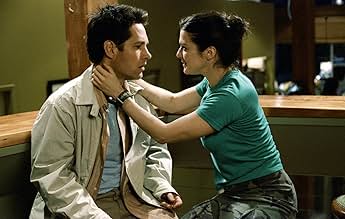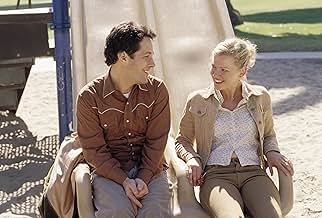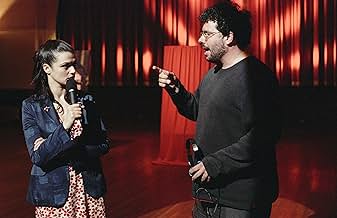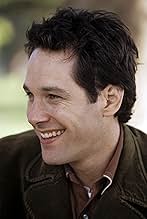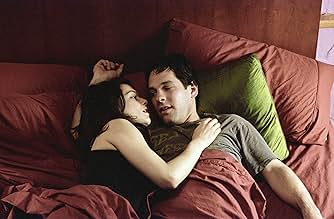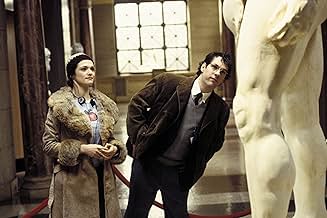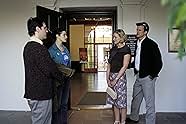A quiet, unassuming man begins to change in a major way as a result of meeting a new, art-student girlfriend, and his friends are unsettled by the transformation.A quiet, unassuming man begins to change in a major way as a result of meeting a new, art-student girlfriend, and his friends are unsettled by the transformation.A quiet, unassuming man begins to change in a major way as a result of meeting a new, art-student girlfriend, and his friends are unsettled by the transformation.
- Awards
- 1 nomination total
Featured reviews
While a well done film, it's not enjoyable. There are enough mean people in the world without voluntarily subjecting yourself to another one that is the heart of this film. Rachel Weisz plays convincingly in this film as a heartless art student who subjects Paul Ruud to her talents as a sculptor of humans. The best thing about this film is Paul Ruud's subtle transformation from geek to chic. By the end of the film, you've realized how convincing his change was. However, just because a movie is well made and well acted does not mean it is worth watching. When I left this movie, I felt as if I had spent two hours in the company of evil and meanness. If you like a think piece that leaves you feeling negative, then this is the perfect movie. But if you're looking to spend your hard earned money on a movie that leaves you feeling better for having spent it, choose another flick.
After the first 30 minutes I felt like the film lacked energy. The pace was a little too slow for my taste, and the intensity too low. I wanted it to be snappier, more sizzling.
But then, about halfway through, it got really interesting. The second half, although it still suffers from some pacing problems, makes up for the first. And then the third act is one of the most brilliant and satisfying third acts I saw in a long time. The ending brings together all of the elements and themes that were planted throughout the movie (our obsession with the way things look, the line between art and real life) to form insights about our lives that are as brutal as they are true.
I am generally fond of Neil LaBute's work - most of the time his works contain more than what they initially seem to be (I haven't see "The Wicker Man" remake yet, but I heard it was horrible). Here, what starts off as your run-of-the-mill romantic comedy/drama, develops into a cynic's paradise, presenting insights into our lives which are as brutal as they are true.
Three of the four actors do a splendid job (Weisz, Rudd & Mol). I especially liked Paul Rudd's performance, and the way his character changes throughout. All three, and especially Rachel Weisz, are convincing in their roles, and deliver multi-layered performances with lots of subtext. Fred Weller's performance leaves something to be desired, but the fact that his role is well written somewhat makes up for that. LaBute has successfully made all four characters three-dimensional and they feel like real people.
Overall, I'd say it was a pretty great movie, certainly entertaining, and an important one to watch and analyze if you are into writing, directing or acting. Somewher, though, I feel like it didn't live up to its full potential. This script, if directed with more intensity, could have become one of my favorite movies, up there with films such as "Closer", "Glengary Glen Ross" or "Oleanna". Maybe it's the transition from the stage to the screen that made LaBute feel like he should make everything more minimalistic and restrained. But it's definitely worth checking out.
But then, about halfway through, it got really interesting. The second half, although it still suffers from some pacing problems, makes up for the first. And then the third act is one of the most brilliant and satisfying third acts I saw in a long time. The ending brings together all of the elements and themes that were planted throughout the movie (our obsession with the way things look, the line between art and real life) to form insights about our lives that are as brutal as they are true.
I am generally fond of Neil LaBute's work - most of the time his works contain more than what they initially seem to be (I haven't see "The Wicker Man" remake yet, but I heard it was horrible). Here, what starts off as your run-of-the-mill romantic comedy/drama, develops into a cynic's paradise, presenting insights into our lives which are as brutal as they are true.
Three of the four actors do a splendid job (Weisz, Rudd & Mol). I especially liked Paul Rudd's performance, and the way his character changes throughout. All three, and especially Rachel Weisz, are convincing in their roles, and deliver multi-layered performances with lots of subtext. Fred Weller's performance leaves something to be desired, but the fact that his role is well written somewhat makes up for that. LaBute has successfully made all four characters three-dimensional and they feel like real people.
Overall, I'd say it was a pretty great movie, certainly entertaining, and an important one to watch and analyze if you are into writing, directing or acting. Somewher, though, I feel like it didn't live up to its full potential. This script, if directed with more intensity, could have become one of my favorite movies, up there with films such as "Closer", "Glengary Glen Ross" or "Oleanna". Maybe it's the transition from the stage to the screen that made LaBute feel like he should make everything more minimalistic and restrained. But it's definitely worth checking out.
Years ago, when I was young and naive about movies, I read a harshly critical review of "The French Connection." The critic's main objection was that the movie deliberately rubbed the viewer's nerves raw in scene after scene, and then when that wasn't enough, applied something like cinematic rubbing alcohol to the abrasions to goad still more extreme reactions. The critic felt bruised and manipulated when the movie was over.
This movie doesn't rub nerves raw and then apply rubbing alcohol; it drills holes straight into the viewer's skull and pours in battery acid. The trouble with this approach is that the viewer is lobotomized almost instantly, unless the viewer is old enough and crusty enough to have seen the kinds of tricks that Hollywood uses to goad us into strong reactions. There's a scene where the anti-protagonist tells the people attending the unveiling of her latest art project that she knows some people will have strongly negative reactions to her work. "Diversity is good," she says in one of the only lines in the movie where her delivery registers just slightly above the robotic, "just don't be apathetic."
That's what the makers of this movie believe in. Love it or hate it, just please please pretty please don't yawn during the movie.
Well, I yawned.
This movie is the cinematic equivalent of every novel Ayn Rand ever wrote, in the sense that its "story" is really a manifesto, and it shows. Sure, if you're young and still intellectually a blank slate, but hungry for ideas, it can provide the starting point for vigorous debates. I suppose. For those of us who don't view the people around us as bugs in a collection, however (probably because we've already had our turns at being treated as a bug in a collection), this movie is just more pseudo-intellectual bile-venting all dressed up as serious, grown-up thinking. Consider such profound observations as, "Cute guys always develop a potty-mouth sooner or later; they think it makes them more adorable." Does this sound like Hegel to you? Or just a cheap cliché?
I wasn't outraged or shocked or horrified or invigorated or captivated or astonished or anything else by this movie, any more than I am by some modern art exhibit that consists of an empty room with flashing lights, or the feces of an artist in a tin, or a severed penis in a jar. No: Just bored. I've seen it before. Five or six years down the road, someone else will come up with essentially the same idea, but they'll have to twist the knife just a bit harder to try to get a reaction from an ever-more jaded audience.
Maybe this time the artist will kill her ersatz boyfriend. In the movie after that, she can cook and eat him. And in the one after that, she'll announce that the hors d'ouevres that her guests are nibbling are none other than the hapless Addam. Each will feature the same huge banner that reads, "Moralists have no place in an art gallery" (remember to make the letters EXTRA BIG like a Wal-Mart banner) and the same pale, Botoxesque, expressionless, emotionless "artiste" that the movie is lauding and skewering at the same time.
Yawn.
This movie doesn't rub nerves raw and then apply rubbing alcohol; it drills holes straight into the viewer's skull and pours in battery acid. The trouble with this approach is that the viewer is lobotomized almost instantly, unless the viewer is old enough and crusty enough to have seen the kinds of tricks that Hollywood uses to goad us into strong reactions. There's a scene where the anti-protagonist tells the people attending the unveiling of her latest art project that she knows some people will have strongly negative reactions to her work. "Diversity is good," she says in one of the only lines in the movie where her delivery registers just slightly above the robotic, "just don't be apathetic."
That's what the makers of this movie believe in. Love it or hate it, just please please pretty please don't yawn during the movie.
Well, I yawned.
This movie is the cinematic equivalent of every novel Ayn Rand ever wrote, in the sense that its "story" is really a manifesto, and it shows. Sure, if you're young and still intellectually a blank slate, but hungry for ideas, it can provide the starting point for vigorous debates. I suppose. For those of us who don't view the people around us as bugs in a collection, however (probably because we've already had our turns at being treated as a bug in a collection), this movie is just more pseudo-intellectual bile-venting all dressed up as serious, grown-up thinking. Consider such profound observations as, "Cute guys always develop a potty-mouth sooner or later; they think it makes them more adorable." Does this sound like Hegel to you? Or just a cheap cliché?
I wasn't outraged or shocked or horrified or invigorated or captivated or astonished or anything else by this movie, any more than I am by some modern art exhibit that consists of an empty room with flashing lights, or the feces of an artist in a tin, or a severed penis in a jar. No: Just bored. I've seen it before. Five or six years down the road, someone else will come up with essentially the same idea, but they'll have to twist the knife just a bit harder to try to get a reaction from an ever-more jaded audience.
Maybe this time the artist will kill her ersatz boyfriend. In the movie after that, she can cook and eat him. And in the one after that, she'll announce that the hors d'ouevres that her guests are nibbling are none other than the hapless Addam. Each will feature the same huge banner that reads, "Moralists have no place in an art gallery" (remember to make the letters EXTRA BIG like a Wal-Mart banner) and the same pale, Botoxesque, expressionless, emotionless "artiste" that the movie is lauding and skewering at the same time.
Yawn.
This film was absolutely not what I expected it to be. In the first half an hour, I even got a little bored, because it seemed like the story was going nowhere. Fortunately, I got my happy ending - no, not at all a film with a happy ending, just an ending that makes the film precious! It really makes you stare at the black screen, with the cast moving in front, and think about what you've seen over and over again. Of course, the brilliant play of Rachel Weisz cannot be left unmentioned, but I think that the others did a great job as well. "The Shape of things" is a film with actually just four actors and one great idea, and trust me, it is worth seeing. I am just wondering how would I feel the second time I watch it!
Surprisingly cold satire with too much empty dialog, but you must really appreciate the attitude: the message is against the feel-good-romances as well as against the gender-politics. If you feel betrayed just because Rachel W says everything you loved was actually art and performance under construction, the film was worth of seeing. And you should note that the "art gallery" in the end of the film has nothing to do with art itself... the meaning of this metaphorical place you can decide yourself.
It may not be a good example of play adaptation, but there really should be more films like this with good self- consciousness, and also more actors like Rachel W who understand the point of irony.
It may not be a good example of play adaptation, but there really should be more films like this with good self- consciousness, and also more actors like Rachel W who understand the point of irony.
Did you know
- TriviaWas originally a play starring Paul Rudd and Rachel Weisz, which played in London in the summer of 2001.
- GoofsIn the park scene where Adam and Jenny kiss, Adam's nose looks normal, but at this point he hasn't had the surgery yet. The surgery happens in the next scene.
- ConnectionsFeatured in Cleanflix (2009)
- SoundtracksLover's Walk
Written by Elvis Costello
Performed by Elvis Costello and The Attractions
Courtesy of Demon Music Group, Ltd., by Elvis Costello
By Arrangement with Rhino Entertainment Co. and Warner Special Products
- How long is The Shape of Things?Powered by Alexa
Details
- Release date
- Countries of origin
- Language
- Also known as
- 人體雕塑
- Filming locations
- Production companies
- See more company credits at IMDbPro
Box office
- Budget
- $4,000,000 (estimated)
- Gross US & Canada
- $735,992
- Opening weekend US & Canada
- $173,246
- May 11, 2003
- Gross worldwide
- $826,617
- Runtime
- 1h 36m(96 min)
- Color
- Sound mix
- Aspect ratio
- 2.35 : 1
Contribute to this page
Suggest an edit or add missing content



